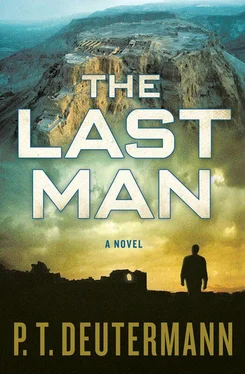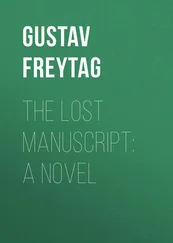He rocked back on his heels. The main thing was that it was indeed there, and, even better, it looked like the top of the cavity was within only a few feet of the surface somewhere over there, near the eastern wall. Precisely where, in relation to the sound source, was not possible to determine from the screen, but his experiments with the rolling ball gave him a pretty good idea.
He closed his eyes, trying to visualize the huge cavern. At last, he thought. Adrian had studied and thought about the incredible history of this place for years, and here was the dramatic final piece of her theory. The story he’d told the academics was a cover. The truth was that Adrian had never been able to swallow the theory that the Zealots had died only to defend their personal honor. These were the survivors of the Roman holocaust at Jerusalem. These people had been the defenders of the last, great Second Temple. They were the Zealots, the wild-eyed Daggermen who had instigated the revolt against Rome in the first place. These had been men who had started a civil war with the superpower of their day over the issue of the Romans bringing graven images of their own pagan gods into the Temple precincts. They had been first and foremost fighters, not philosophers. She’d been convinced that there had to have been more to this tragedy, something else that drove them to their incredible mass suicide. She was certain they had been protecting a great secret, and now he had direct evidence of the place where they might have hidden it.
From her study of the history, Adrian had been convinced they would have brought out holy objects from the Great Temple, religious scrolls, or even perhaps some of the fabled Temple treasures described in the Copper Scroll of Qumran, and they would have brought these things here, to Masada, the last stronghold, which they believed to be impregnable to direct assault and impervious to a siege. Her theory was this: When they finally realized that the Romans were, after all, going to take the place, they elected a dagger in the throat to ensure the Romans would never parade the sacred final relics of their god’s holy Temple in front of the barbaric mobs of faraway Rome.
So why hadn’t the archaeologists found them? The Romans had never found anything of value, because Flavius Josephus, their principal apologist for the Jewish wars, would have mentioned it. Adrian had shown him pictures of existing Roman coins that depicted a triumphant soldier standing next to a palm tree, against which sat a despondent woman, surrounded by the inscription JUDAEA CAPTA. Adrian felt that these coins celebrated the destruction of Jerusalem, not Masada.
Adrian had fixated on a single line in Yigael Yadin’s final report: The cisterns have not been explored. Subsequent digs had gone into the cisterns, but nothing of real interest had been found. He himself had looked into the main cisterns yesterday morning, and they were indeed, as Judith said, big dry holes, impressive feats of ancient engineering, undeniably, but still empty. On the other hand, if Adrian had been right about all this, there was a good chance that he might find their secret hoard in this enormous undiscovered cistern. The one she felt had to be there, because, otherwise, all that runoff water would have been wasted. The one that appears, he exulted, to be right where she thought it would be!
He stood up. Time to get back to the hostel. Tomorrow he would come back up here, minus Judith, if he could manage it, and search for a way into the cistern. He hoped that if he found it, there would be steps cut into the walls like in the northern cisterns. If not, he had come prepared to lower himself on a wire, using his diving harness, if he had to. Assuming he could find the entrance during the day, he would stick to the schedule of going back down around three and going to bed early, and then he would come back up here tomorrow night to explore the cistern and see if he could discover what the Zealots had been protecting. He might find another empty hole, but his excited heart told him otherwise.
He gathered up all the equipment, checked again to make sure that any signs of the seismic source explosive were gone, slipped into the backpack, and headed for the western gate. It was almost 3:00 A.M.; moonrise would come in about an hour. He wanted to be most of the way back to the hostel before then. He let himself through the western gate, went down the steel platform steps to the siege ramp, and paused for a few minutes to survey the ravines on either side and to listen. There was only the sound of the night breeze whistling gently through the latticework supporting the steps. The ramp stretched down in front of him like a competition ski jump.
His adrenaline was pumping, but, by God, she had been right! All the professional explorers had missed the fact of another cistern, and a huge one at that. Much bigger than the ones on the northern face. Maybe too big to have been made by human hands: Probably it was a natural cavern and not a cistern at all. Maybe it had been unknown to even the Herodian occupants.
He sighed. “Don’t get ahead of yourself,” he muttered out loud.
He retrieved his stick and set off down the ramp, trudging in short, sliding steps down the loose sand and gravel to keep his balance. Except for the strain on his thighs, it was still a lot easier than climbing up had been. He turned left off the bottom of the ramp and slid down the western edge of the ravine until he scrambled all the way to the bottom in a shower of sand and small rocks. He rested again for a few minutes and then set out to make the climb up the western ravine. It took him forty-five minutes to get to the junction at the southwest corner of the mountain. He was more tired than he had expected to be.
Physical reality was setting back in, especially now that the excitement of discovery was wearing off. He topped the western ravine and stumbled over the crest, where, unbalanced by the pack and unexpectedly soft sand, he sat down hard and slid halfway down the slope of the south-side ravine, losing his stick. Pursued by a silent avalanche of sand and small rocks, he fetched up hard against a large boulder that knocked the wind out of him. What little wind was left, he thought. When everything stopped moving, he shrugged out of the backpack and flopped over onto his back in the sand to rest, after first making sure he hadn’t landed next to a snake. It was dark down here, but his eyes were fully night adapted and the starlight was much brighter. Amazingly, the sand was still warm, and he scrunched down into it.
Which was when he heard the murmur of voices.
He froze in the shadow of the rock, not daring to even move his head.
It sounded like the voices were above him, up on the top edges of the western ravine. They were speaking softly, but in the desert air, every word was clear, if totally incomprehensible. Israeli soldiers? Bedouins? An image of hooded men with knives popped into his mind. He squinted, listening hard. It sounded like Hebrew, but he didn’t know either language well enough to be sure. Then came a surge of panic when he realized that they should be able to see him.
All his fatigue vanished. Don’t move, he thought. Don’t move one muscle. Don’t turn your white face up the hill. Meld in with the sand and the rocks. With any luck they were just finishing their patrol, anxious to get back down to the truck, and not carefully probing the sands for sign of human passage, or sweeping the slopes of the ravine with infrared devices. Or just looking for tracks.
He tried hard to control his breathing, aware that a light cloud of dust probably still hung in the air around him from his slide down the sand hill. There had to be a big furrow down that slope, too, more evidence of his presence. Hell, they had to spot him.
Читать дальше












